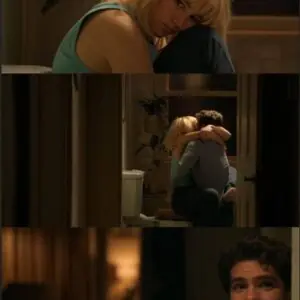Directed by Adrian Lyne | Starring Demi Moore, Robert Redford, Woody Harrelson
When Indecent Proposal was released in 1993, it sparked controversy, conversation, and curiosity—mainly due to its provocative premise: What would you do if someone offered you a million dollars to sleep with your spouse? It’s a question that director Adrian Lyne (of Fatal Attraction and Unfaithful fame) explores in this morally complex, emotionally charged drama that probes the boundaries of love, marriage, and money.
At the heart of Indecent Proposal are Diana and David Murphy (played by Demi Moore and Woody Harrelson), a young, attractive, and deeply-in-love couple living in California. David is an architect, Diana is a real estate agent, and together they dream of building their perfect home. But when a financial downturn wipes out their savings and their dreams begin to crumble, desperation leads them to Las Vegas in hopes of winning back what they’ve lost.
It’s in Las Vegas that they cross paths with John Gage (Robert Redford), a suave, ultra-wealthy billionaire with a taste for high-stakes risk—and, as it turns out, Diana. After observing the couple at the gambling tables and recognizing their desperation, Gage makes an outrageous offer: one million dollars for a single night with Diana. What begins as a shocking suggestion turns into a serious proposal, forcing David and Diana to confront the foundations of their relationship and make a decision that will affect them forever.

The brilliance of Indecent Proposal lies not only in its salacious question, but in how it handles the emotional consequences. While the concept may sound like tabloid fodder, the film is less about sex and more about trust, sacrifice, and the fragility of human connection under pressure. Lyne, known for his stylish direction and exploration of erotic themes, walks a tightrope between fantasy and moral fable, offering a glossy but thoughtful meditation on the power money holds over people’s lives and relationships.
Demi Moore delivers a strong, emotionally nuanced performance as Diana. Her character is confident, passionate, and ambitious, but also vulnerable. Moore’s portrayal captures the inner turmoil of a woman torn between love and loyalty, temptation and self-respect. It’s arguably one of her most compelling roles of the 1990s. Woody Harrelson also does well with the part of David—charming, impulsive, and later, unraveling under the weight of jealousy and self-doubt. His transformation from confident partner to emotionally wrecked husband feels believable, even if occasionally melodramatic.
Robert Redford brings a layer of dignity and sophistication to the character of John Gage. Instead of playing the role as a sleazy billionaire trying to buy sex, Redford gives Gage an enigmatic quality. He’s persuasive, mysterious, and even likeable, despite the immorality of his proposition. His performance adds complexity to the situation—he’s not a villain in the traditional sense, but rather a mirror to the couple’s own desires and weaknesses.

One of the film’s greatest strengths is its cinematography. Lyne and cinematographer Howard Atherton infuse the film with a sensual, almost dreamlike visual style. From the opulence of Las Vegas casinos to the intimate, softly lit scenes between David and Diana, the visuals complement the emotional highs and lows of the narrative. The musical score by John Barry (best known for his work on James Bond films) adds an elegant, romantic layer to the film, enhancing its melodramatic tone without overwhelming it.
However, Indecent Proposal is not without its flaws. The dialogue occasionally veers into cliché, and the pacing can feel uneven—particularly in the second half, where the emotional fallout of the “deal” plays out in a series of prolonged scenes. Some critics have pointed out that the moral complexity promised by the premise doesn’t always materialize in a satisfying way. The ending, especially, has been criticized for being too tidy and sentimental, offering a resolution that feels more like a fantasy than a consequence of real-world choices.
Despite these issues, the film remains memorable because it taps into universal fears and desires. At its core, Indecent Proposal isn’t just about sex or money—it’s about insecurity, temptation, and the limits of love. It asks how far people are willing to go to preserve their dreams, and whether love can survive betrayal, even if that betrayal was mutually agreed upon.
In today’s world, where reality TV, social media, and influencer culture often blur the line between public and private, the film’s central question feels more relevant than ever. Would you trade something deeply personal—your dignity, your intimacy—for wealth or security? And if so, what would that trade do to your sense of self, your relationship, your future?

The film leaves the viewer with no easy answers. It’s deliberately provocative, intended to spark debate, not moral clarity. It invites judgment and introspection in equal measure. And while it may not be a perfect film, it accomplishes what many dramas aspire to: it makes the audience feel, question, and think.
Final Verdict
Indecent Proposal is a stylish, emotionally charged drama that dares to explore taboo territory with sophistication and heart. Powered by strong performances, especially from Demi Moore and Robert Redford, and guided by Adrian Lyne’s sensual direction, it offers a compelling—if sometimes flawed—exploration of the cost of love and the price of compromise. Thirty years later, it remains a cultural touchstone and a conversation starter, which is perhaps the highest praise one can give a film of its kind.
Rating: 7.5/10





